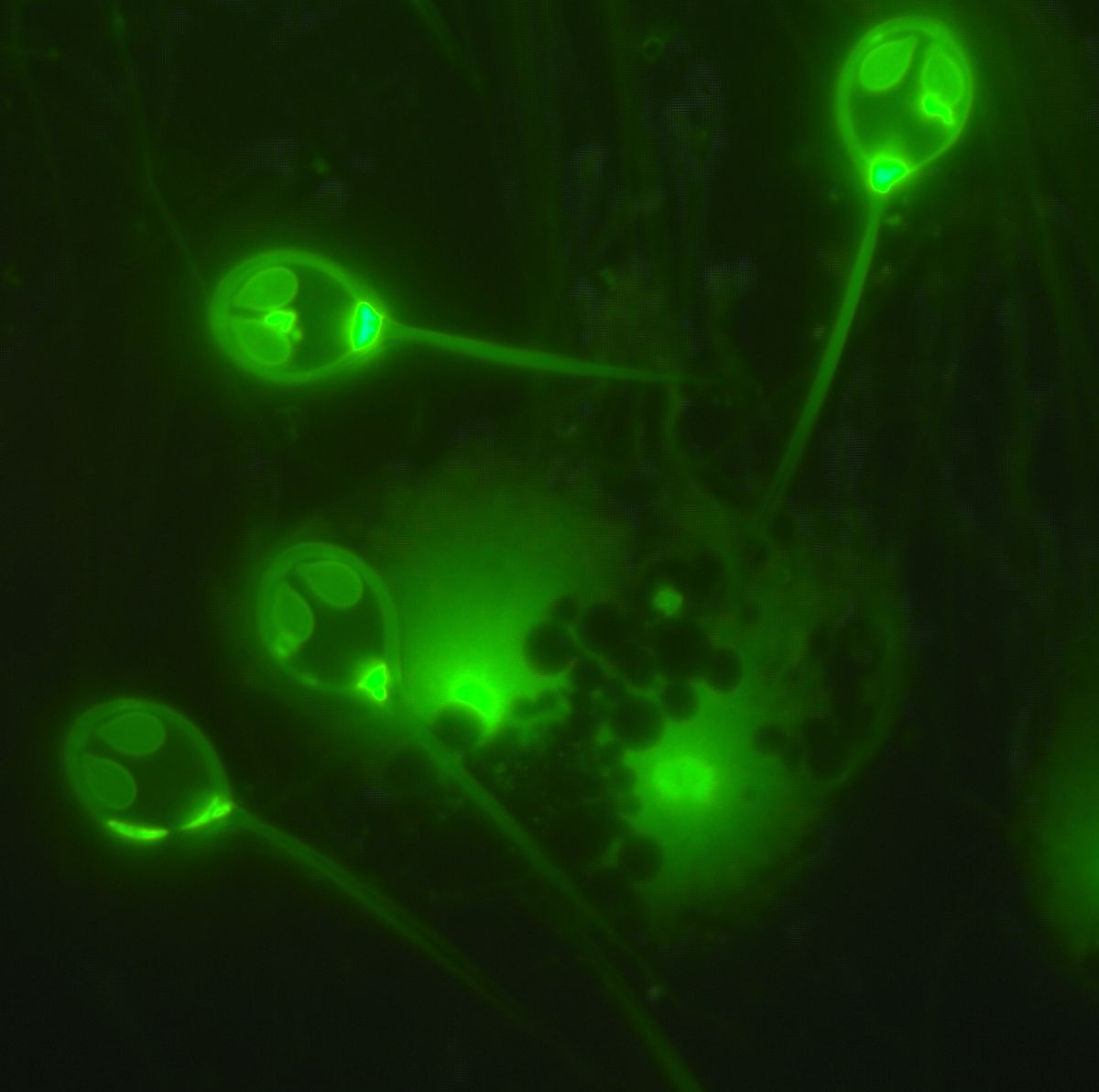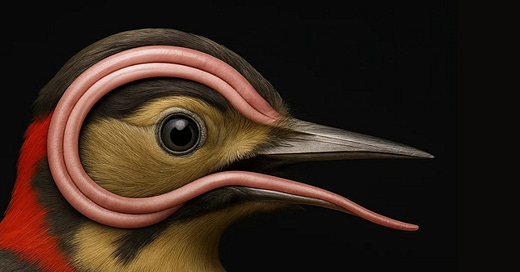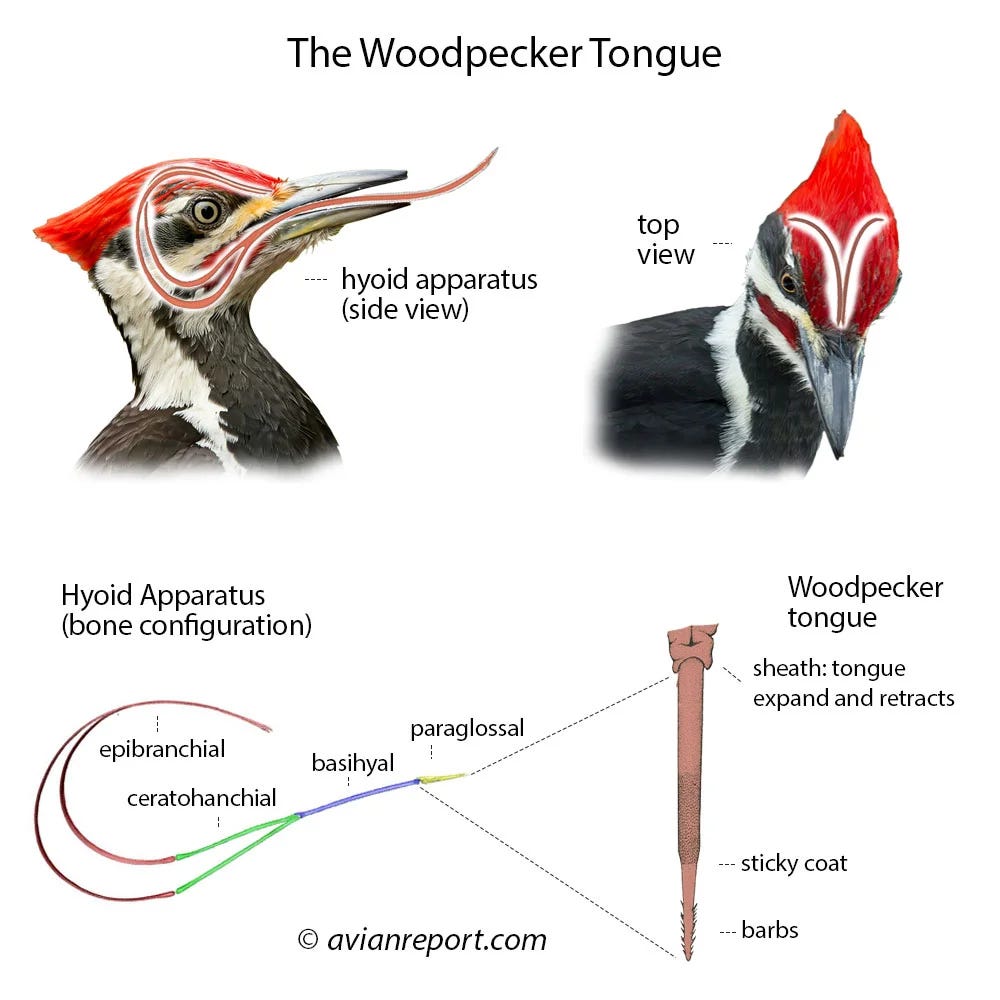very long tongues & Turgenev
+ cute salmon parasites, Grace Paley, and other stories and citations
a woodpecker’s tongue is super long and curls around its skull like whoa, but sadly the story about the tongue cushioning a woodpecker’s brain from concussions turns out not to be true
apparently a bunch of factors combined all help protect woodpeckers from brain injury - the structure of the beak and skull, tiny little smooth brains with very little spare room inside the skull to jostle around in, and strong neck muscles
their tongues are still pretty awesome, though
and they’re not the only ones! hummingbirds have long eyeball-wrapping tongues like some sort of alien worm parasite but useful
aren’t Henneguya salminicola so cute? they look like Studio Ghibli creatures
not only CAN they live without oxygen1, they MUST - these little jellyfish-cousins lost their mitochondrial genome, and with it, the ability to perform aerobic cellular respiration - without mitochondria, they can’t breathe
we all remember that mitochondria is the powerhouse of the cell, but dunno about you but i never really think about what that actually means - about a third of our mitochondrial dna is all about oxidative phosphorylation. aka, our process for turning oxygen into ATP. y’know, getting energy from breathing. seems important.

this little buddy really downsized along the way - it “gradually evolved to have just about none of its multicellular traits” - which kinda reminds me of our old fav the pumpkin toadlet2, which can’t hear itself croak because it lost its tympanic middle ear when it miniaturized
thoughts on reading George Saunders’s A Swim in a Pond in the Rain
The Singers3 by Turgenev is generally seen as being about how making people feel is more important in art than using fancy technique, but I also read it as a discussion of different ways we deal with the inevitability of death
the whole story describes an oppressively hot, reddish hellscape:
Kolotovka is consistently described as oppressively hot, scorched, mournful, despondent, with “cinder-like earth”, baking under the sun’s “pitiless rays”
the ravine is “worse than any river (for a river could at least be bridged) - I’m in Tolstoy mode this year, so this made me think of the bridge in W&P, the line that separates life and death
and “at the bottom, dry and reddish like copper", lie huge flagstones of shale”
the white seagull is imagined with the sea “roaring away dully and menacingly in the distance” under the “blood-red” sun
the contest feels like something dreamy or unreal, our souls being judged
walking into the room we see its “habitual darkness” despite the fine shaft of light through the window - “all the objects in it were dimly illuminated, their outlines blurred”
the Wild Gentleman reads to me like some sort of fallen angel. He has “absolute calm confidence in his own strength”, “nobody knew from where he had descended on our district”, “neither could anyone say positively what he lived on: he was engaged in no trade” and yet he “enjoyed enormous influence in all the district; he was obeyed instantly and eagerly… he spoke and was obeyed: power always claims its due.” We’re a bit scared of him, maybe - he’s mysterious and “it was as if tremendous forces were sullenly hidden within him”
the Wild Gentleman tells Yashka - “Sing as God tells you.”
(tbf Turgenev was not religious, though)
results and aftermath
so how do we face death - with giddy extravagant life, leaning into our beautiful (frivolous?) ornate trills, or with deep mournful appreciative acceptance and grief and respect?
as we go outside again, the air is still too hot but the night sky is beautiful. We’re still stuck here, there’s no escape and it must be faced somehow, and maybe we’ve learned to appreciate it nonetheless
and then that ending, acknowledging that some try to fool themselves into thinking there’s maybe there’s a third option - but although we can attempt to avoid destruction (“Dad wants to give you a good hiding!”) of course we know it’s hopeless, the call still keeps coming for us through the shadows of the night
oh and Tolstoy’s Master and Man reminded me so strongly of Jack London’s To Build a Fire, surely Tolstoy must’ve been an influence on London there?
“It is possible to create the feeling of a character adrift without needing to have the narrative be adrift.” - VS Naipaul
and speaking of god, the Talmud claims that god plays with leviathan like a person might play with a dog (Avodah Zarah 3)
other short stories I recently read and enjoyed
A Conversation with My Father by Grace Paley (reread via) (according to legend, Grace Paley taught that every good story is at least two stories, and it really shows here) (“In your own life, too, you have to look it in the face.”)
My Father Addresses Me on the Facts of Old Age by Grace Paley (“Some people go running till late in life—for the muscles, they say, but the heart knows the real purpose. The purpose is the expansion of the arteries, a river of blood, it cleans off the banks, carries junk out of the system. I myself would rather remind the heart how frightened I was by my brother than go running in a strange neighborhood, miles and miles, with the city so dangerous these days.”)
AITA for telling my genetic double she can’t be transgender? by Leon Tomova
thanks for introducing me to this adorbs non-breather,
, you’ve brought joy and delight into my life!3rd time mentioning pumpkin toadlets in the short history of this newsletter, I must be more into them than i realized
I could only find the Garnett translation online, but I actually read the Magarshack translation included by Saunders







Great read! And thank you for the mention :)